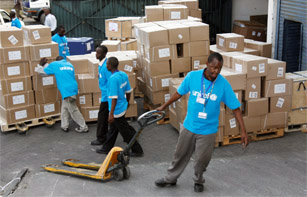A version of this story has been published at unicef.org

Credit: UNICEF/NYHQ2010-1057/Susan Markisz
UNICEF Executive Director Anthony Lake joined the Government of Kenya and other partners on 29 October to role out an innovative approach to prevent the transmission of HIV from mothers to their babies (PMTCT). The initiative includes a combination of activities and supplies including a “Mother-Baby-Pack” of antiretroviral drugs and antibiotics, which women can easily administer at home.
The “Mother-Baby-Pack” is part of the government’s Maisha mother-to-child transmission free Zone Initiative. This pioneering programme is designed to help virtually eliminate mother-to-child-transmission of HIV and paediatric AIDS by 2013 in Nyanza and Rift Valley provinces, where about half of all Kenyan children with HIV live, and by 2015 in the entire country. Without treatment, around half of all babies born with HIV will die before their second birthday
Mr Lake commended the Kenyan government for its commitment to take ground-breaking steps to expand and strengthen the quality of PMTCT services. “Maisha means ‘Life’ in Kiswahili, and I can think of no better way to describe a programme with the potential to save so many lives,” he said. “The Maisha Initiative is a significant step forward towards our common goal of virtually eliminating mother to child transmission in Kenya.”
Maisha means ‘Life’ in Kiswahili, and I can think of no better way to describe a programme with the potential to save so many lives
Anthony Lake, UNICEF Executive Director
The roll-out in Kenya of the “Mother-Baby-Pack” marks the beginning of a phased implementation in four countries, including Cameroon, Lesotho and Zambia. It is scheduled to run until mid-2011. During this initial phase, UNICEF and its partners will closely monitor the acceptance of the pack by women, as well as the quality of supply and distribution.
The packs were developed by UNICEF in collaboration with the World Health Organization (WHO), UNITAID, and other partners. Health workers in antenatal clinics will distribute them to pregnant women living with HIV, but who do not yet need antiretroviral treatment for their own health. The initiative is designed to reach pregnant women who have tested positive for HIV, but who might not otherwise return to a clinic following their diagnosis.

Mother-Baby Packs arrive in Nairobi. They are then loaded onto a UNICEF truck for distribution to other parts of Kenya. Credit: UNICEF Kenya/2010/Joseph Munga
The initiative is supported financially by a number of partners including the US Government, UNICEF National Committees, the Clinton Health Access Initiative (CHAI) and the Mothers-to-Mothers (M2M) programme.
While adult HIV prevalence in Kenya has declined steadily, there are still some 22,000 new infections annually among infants through mother-to-child transmission. Overall, an estimated 1.4 million people are living with HIV in the country, including around 81,000 pregnant women.




